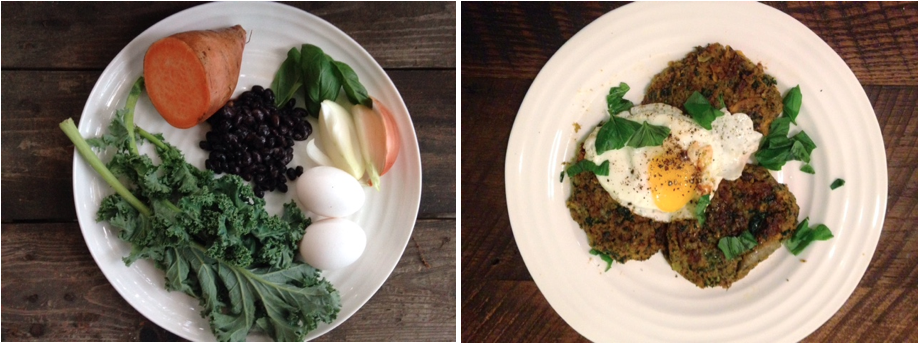So pretty much the worst thing that could have happened to me in this Live Below the Line challenge for Development in Gardening where I have to eat and drink on $1.50 a day for a week, just happened…well, maybe not the worst thing but pretty close.
Last night I was all set to make my precious dinner. After getting my son to bed, my stomach rumbling, somehow having resisted the urge to pick-up any uneaten cheese off his dinner plate, I got busy in the kitchen. I was taking a crack at a dinner idea I thought might work but in actuality I wasn’t sure how it would go. The plan was to make black bean, sweet potato and kale cakes with 2 fried eggs on top. My biggest concern was whether or not they would hold together without breadcrumbs or an egg.
Since I couldn’t have an avocado, or melted cheese, or a buttered roll, I figured that a runny egg would kind-of meet my savory craving. By omitting the egg from the sweet potato cakes I would have two “dippy” eggs on top.
I placed my two eggs out on the counter then set to work on the sweet potato cakes. The cakes turned out pretty good. They certainly weren’t firm but they maintained a burger-like consistency, and when seasoned with some S&P, a little cayenne, and topped with basil they tasted really good!
Here’s where the tragedy happened. In my flurry of sautéing and food processing, one of my precious eggs fell off the counter and shattered all over the hardwood floors.
In that moment I’m not sure who was more broken, the egg or me. After cleaning up the mess, I was faced with a decision. Grab another egg that I had budgeted for later in the week….no way. Grab another egg that I hadn’t budgeted for and pretend the whole thing never happened, which felt like cheating, or do what anyone living below the poverty line would do, and eat one less egg tonight.
I really struggled with this. I have been doing really well in this challenge. I’ve stuck to the limits, managed to make my meals pretty balanced, resisted cravings and I haven’t had coffee in what feels like an eternity, so this just wasn’t fair. In the end I couldn’t stop thinking of the village I lived in for two year as a Peace Corps volunteer in Senegal. If food spoiled or the crops got ruined, there was no back-up. So, begrudging, I went one egg down and savored every runny drop.

a banana circle used to divert flooding
rains from washing-out the garden
The whole thing made me realize anew how delicate the existence of the subsistence farmer is. When you count on the rains to come at a certain time in the year and plant everything you might consume and/or sell for the year during that precious window of time, you can start to imagine how crippling it can be when the rains become erratic. If they come late or the season is too short, if they come early before you’ve prepared your fields, if they come so heavy that they wash your tiny seeds away, your entire harvest could be ruined. These are all stories I’ve seen first hand from my time in Africa and tonight I’m reminding of it anew.
One year when I lived Senegal, the rains came as expected and everyone in the village planted their peanuts. But, unexpectedly the rains disappeared and every one’s crops were spoiled. Some had extra stores to plant again but many lost everything. That was the year I learned about the hungry season.

in and the hot sun’s rays from burning the young plants
It is more critical now than ever, for farmers to become climate resilient. I’m proud of the work Development in Gardening (DIG) is doing to equip households for the reality of changing weather patterns. Water conservation is at the top of the list, but so are measures to protect a farm from flooding, proper ways to save and store seeds, crop diversification, teaching good farm management practices which includes financial management, and building support networks by encouraging farmers to connect through community. DIG’s commitment to teach climate resilient practices is critical for smallholder farmers who are less equipped to weather the storm.
Climate change is expected to have a growing impact on all farmers around the globe, but the smallholder farmer will feel the negative impacts more acutely and more immediately. He/she is disproportionately vulnerable to the negative effects of this changing world, and while my broken egg was naturally upsetting, it only reminded me of the magnitude and urgency of the challenges facing smallholder farmers today. It’s never a good idea to put all your eggs in the same basket.
Learn more about Development in Gardening here.
Support my efforts to Live Below the Line by donating to DIG here.




